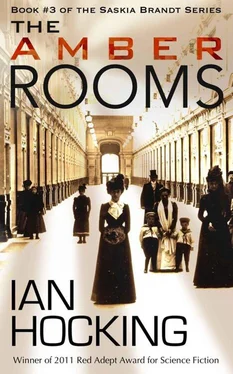Here, in the witching light, they approached an oval dining table. Saskia allowed Kamo to seat her in a velour chair. His mouth did not betray his frustration. Her place was laid with many sets of silver cutlery. The crystal glasses were frosted with the Imperial arms. Silver ice buckets held wines of all shades and sugared fruits were arranged in tiers. A pole rose from the centre of the table and upon it was a Venetian mask, trailing red ribbons from its eyes. It reminded Saskia of the bloody tears she had cried in a border town the previous autumn. Kamo took the seat on her right.
‘You and your partner make thirteen,’ said the woman on her left. She was dressed as an angel. Her wire wings were draped with goose feathers. Her carmined lips suggested an older woman of fifty or so. Playfully, she said, ‘The first to stand will be unlucky for a year. What have you come as, young woman?’
‘She is the Allegory of the Future,’ said Kamo, ‘where superstition will have no role.’ His tone suggested he wanted to end the conversation there, but Saskia did not intend to remain silent throughout the meal. No doubt Kamo feared that she would reveal herself. It was, however, more likely that the guests would find their silence conspicuous.
‘Do you see the wires on my arms?’ asked Saskia. Her Russian had never been more perfect, and she was aware of the beauty in her voice. Several of the nearby conversations ceased as guests turned towards her. ‘They carry electricity.’
The woman smiled as she poured. ‘I’m from heaven,’ she replied. ‘Tell me about your place and I’ll tell you about mine.’
‘In the future,’ said Saskia, speaking to the covered faces, ‘we have buildings so tall they reach the clouds. The sun shines on their spires and there is plenty to eat and drink for all the people.’
A servant’s arm entered her view and put a champagne flute next to her plate. Saskia was distracted by the thought that the narrow glass and the champagne, with its delightful tint, had come together in this moment with the elegance that only existed with transience. The two would separate soon and never meet again. On the surface of the glass, she saw the greenish reflection of the fires, and the curled fists of Kamo.
‘At least,’ she continued, ‘there is plenty for those who live in the tall buildings. Others live underground.’
‘My dear,’ said Kamo, in the belittling tone of a husband, ‘you will overplay your part.’
‘I want to hear about them,’ said the Angel, and several of the other guests motioned for Saskia to continue.
‘Their faces are dark and hidden,’ Saskia said. She had turned to Kamo. ‘They walk treadmills and operate huge dynamos. Every movement of each body is captured, transformed, and used for the betterment of their superiors in the sky, where the sun shines.’
‘Darling, you are drunk,’ said Kamo. He addressed the table: ‘She is drunk.’
‘Nonsense,’ replied a man in a black hat. ‘She is lucid and entertaining. Tell me, madam, how might one travel from St Petersburg to Moscow in your future?’
‘In ships that sail through the air.’
‘Winged ships?’ asked Angel.
‘Oh, yes.’
‘Flapping wings, then,’ said the man in the black hat. ‘Like birds!’ He followed this with a bellowing laugh that drew glances from the tables around them. Kamo added his own, quieter laugh, and put his hand on Saskia’s thigh.
‘Fixed wings,’ she said, addressing the man but looking at Kamo. ‘Unless one wishes to travel by balloon, for which no wings are required. These air ships dock on the spires of the skyscrapers.’
‘Of course,’ Angel said. ‘Heavier-than-air machines.’
‘We dance,’ said Saskia, smiling. ‘We dance to music produced by machines.’
‘Automata?’ asked the man in the black hat.
‘And the automata are so indistinguishable from flesh-and-blood humans that men lust after them.’
‘What powers these automata?’
Saskia laughed. ‘They are electric, of course.’
‘Electric!’
As table laughed with her, the moment—all of them, with the exception of Kamo, laughing at the idea of electric automata—was clear to her with such brightness, such sharp meaning, that she lost the desire to talk any longer. She put a napkin to her mouth and coughed. The sound covered the fibrillation of her breath. The mask, likewise, hid her tears.
~
At sixteen minutes to midnight, Saskia and Kamo were waiting in the chamber between the dining room and great hall. An ivy arch had been installed near the tiled stove. Beneath it, a wooden bridge, painted silver, was intended to recall the grace of Venice. The entire scene had been created by a photographic company to produce souvenirs of the event. The camera and its tripod were, however, unattended, and there were no more than a dozen people in the room at a given moment. Saskia and Kamo moved behind the ivy arch, which partially concealed them.
‘That was stupid,’ said Kamo. He put his lips against her neck. Her skin shuddered as though his tongue was a settling mosquito. ‘There will be no further delay. We have fifteen minutes.’
‘Sixteen. By that time, most people will be outside to watch the midnight fireworks.’
‘How will we escape?’
‘Through the private apartment of the Empress Maria Fyodorovna. There is an iron staircase that will take us to the park at the rear of the palace.’
‘I don’t like waiting,’ he said. She could smell the acid on his breath. It made her think of the green flames. Kamo opened his doublet. Inside, an apple grenade hung from his belt.
She curtseyed a little, as though his lips had weakened her.
‘Where did you get that?’
Kamo drew his lips back. It was the smile that had always been prelude to murder. ‘Are you frightened for your delightful dinner companions, Lynx?’
‘They are people,’ she whispered. ‘Don’t abdicate your responsibility to forces behind your control. Don’t see them as already dead.’
As she kissed his ear, she noticed that Kamo had his weight on his right leg. The bomb, fist-sized, looked heavy. Saskia had clocked Kamo’s reaction to a visual stimulus at 280 milliseconds. Unusually fast. Given the amount of wine he had drunk, his weight, and his age, she estimated his blood alcohol to be one tenth of a percent. Its relaxing effect would improve his simple reaction time but impair his judgement.
She withdrew her hand from the warmer. She made a fist to help flex her biceps.
‘He gave it to me.’
Saskia tried to swallow, but could not. She felt the room darken.
‘Are you saying that he is here?’
‘You’re scared.’
She was. Saskia struck Kamo’s heart with a sharp, penetrating blow that almost tore her biceps. He coughed and fell against the wall. His mask remained jolly but his mouth was downturned. She looked hard at his throat, slowed her vision, and saw the subtle, blooming redness of his pulse. It was weak and irregular. His mouth opened, gulping silently. His lips became cyanotic as his heart misfired. The strike had been placed well.
Saskia looked around the ivy arch. Nobody had noticed her attack. She reached inside his doublet and removed the apple grenade. There was no obvious method of disposal. She could not think of a place—laundry chute, punch bowl, stove—where any noble or servant would be safe.
She put it into the fabric bag at the base of her back and buttoned it with an expert pinch of her fingers.
The eyes behind Kamo’s mask were bloody. Saskia put her lips upon his in a passionate, open kiss; turned his head away from the hall; reached up and pinched his nostrils closed. He had barely the strength to lift his arms. Saskia could hold her breath for six minutes. Kamo would not manage thirty seconds. She stared into his huge, blurred eye, and saw the wadded skin of his cheek shake. She could bring him the gift he had given so many others.
Читать дальше












